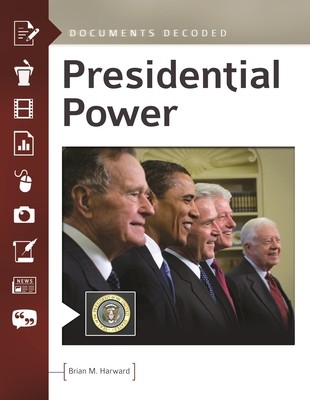
- We will send in 10–14 business days.
- Author: Brian M Harward
- Publisher: ABC-CLIO
- Year: 2016
- Pages: 343
- ISBN-10: 1610698290
- ISBN-13: 9781610698290
- Format: 21.3 x 28.2 x 2.8 cm, hardcover
- Language: English
- SAVE -10% with code: EXTRA
Reviews
Description
Presidential Power: Documents Decoded provides a thorough examination of the historical and political context of key, critical moments in constitutional history and presidential power that makes possible opportunities for students to explore American politics in an interesting, memorable, and dynamic way. Each of the case studies reveals important dimensions of the constitutional order in the United States--and enables readers to better grasp how executive power has shifted and expanded.
The book takes specific events, people, institutions, or ideas and places them in a broader context so that readers can observe patterns and make connections among seemingly disparate happenings and concepts relating to executive power. Accompanied by explanatory sidebars, the included primary sources let students examine actual documentary evidence of key elements of executive power--for example, the presidential memorandum, the National Security cable, and the prisoner's petition--and reach their own judgment of the implications of that document for the American political system.
EXTRA 10 % discount with code: EXTRA
The promotion ends in 20d.21:28:21
The discount code is valid when purchasing from 10 €. Discounts do not stack.
- Author: Brian M Harward
- Publisher: ABC-CLIO
- Year: 2016
- Pages: 343
- ISBN-10: 1610698290
- ISBN-13: 9781610698290
- Format: 21.3 x 28.2 x 2.8 cm, hardcover
- Language: English English
Presidential Power: Documents Decoded provides a thorough examination of the historical and political context of key, critical moments in constitutional history and presidential power that makes possible opportunities for students to explore American politics in an interesting, memorable, and dynamic way. Each of the case studies reveals important dimensions of the constitutional order in the United States--and enables readers to better grasp how executive power has shifted and expanded.
The book takes specific events, people, institutions, or ideas and places them in a broader context so that readers can observe patterns and make connections among seemingly disparate happenings and concepts relating to executive power. Accompanied by explanatory sidebars, the included primary sources let students examine actual documentary evidence of key elements of executive power--for example, the presidential memorandum, the National Security cable, and the prisoner's petition--and reach their own judgment of the implications of that document for the American political system.


Reviews